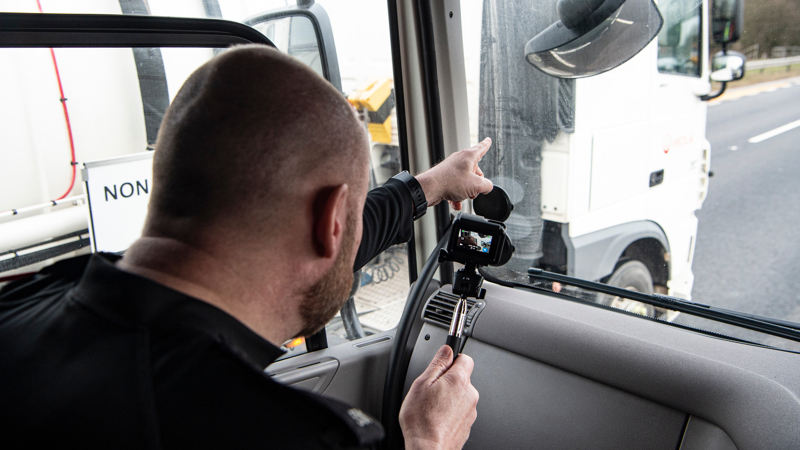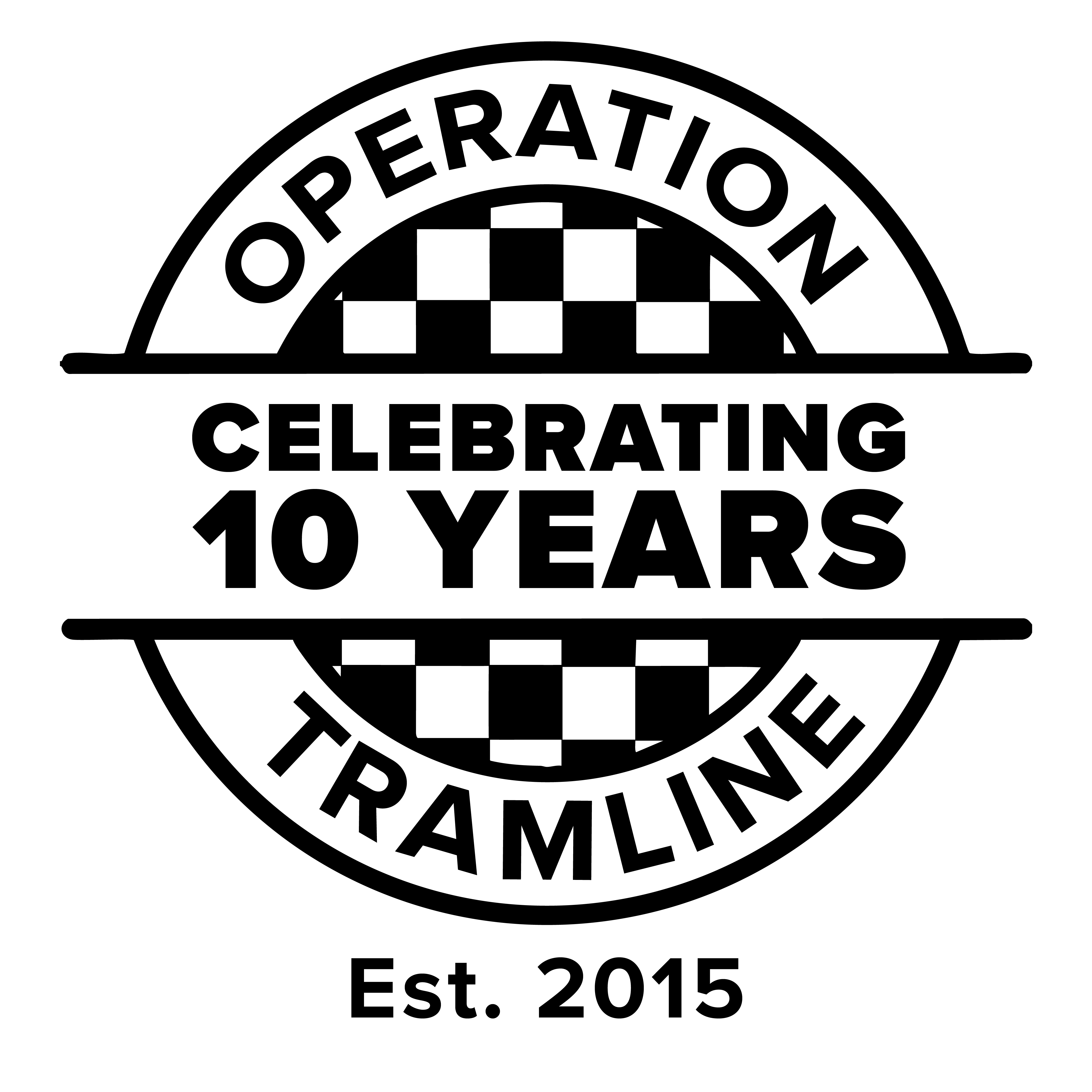Tackling dangerous driving behaviour
We want to encourage motorists to think about their driving and be safe on our roads. This means tackling dangerous driving behaviour

Operation Tramline - our HGV camera cabs
We are working with our police partners to make sure that:
- offences are spotted
- drivers are prevented from causing harm to themselves or others
One way we do this is by using HGV camera cabs in targeted multi-agency operations in different regions across England and Wales.
We supply HGV camera cabs to police forces. From the HGV cab's elevated position, officers can spot and record evidence of risky driving behaviour – whatever vehicle the motorist is driving.
Consequences for drivers range from warnings to fixed penalty notices, court summons or arrest.
Police also use the initiative as way to engage with people. It gives them an opportunity to offer advice to drivers.

Operation Tramline in 2025
Find out:
- where our three cabs are each week
- the police forces we’re working with to reduce the number of people killed and seriously injured.
North
June 2025
16 June 2025 - South Yorkshire
23 June 2025 - Cumbria
30 June 2025 - Greater Manchester
July 2025
7 July 2025 - Greater Manchester
14 July 2025 - Humberside
28 July 2025 - Cheshire
August 2025
4 August 2025 - Summer break
11 August 2025 - Summer break
18 August 2025 - Summer break
25 August 2025 - Summer break
September 2025
1 September 2025 - South Yorkshire
8 September 2025 - Humberside
15 September 2025 - Cleveland
22 September 2025 - Durham
29 September 2025 - Merseyside
October 2025
6 October 2025 - Cheshire
13 October 2025 - Cleveland
20 October 2025 - Durham
27 October 2025 - Cumbria
November 2025
3 November 2025 - Humberside
10 November 2025 - West Yorkshire
17 November 2025 - North Yorkshire
24 November 2025 - South Yorkshire
December 2025
8 December 2025 - West Yorkshire
Midlands
June 2025
16 June 2025 - Staffordshire
23 June 2025 - Northamptonshire
30 June 2025 - West Mercia
July 2025
7 July 2025 - Gwent
14 July 2025 - West Midlands
21 July 2025 - Warwickshire
28 July 2025 - Northamptonshire
August 2025
4 August 2025 - Summer break
11 August 2025 - Summer break
18 August 2025 - Summer break
25 August 2025 - Summer break
September 2025
1 September 2025 - Warwickshire
8 September 2025 - Staffordshire
15 September 2025 - West Mercia
22 September 2025 - Lincolnshire
29 September 2025 - Nottinghamshire
October 2025
6 October 2025 - Derbyshire
13 October 2025 - Northamptonshire
20 October 2025 - Warwickshire
27 October 2025 - Leicestershire
November 2025
3 November 2025 - Derbyshire
10 November 2025 - Lincolnshire
17 November 2025 - West Midlands
24 November 2025 - Warwickshire
December 2025
1 December 2025 - Staffordshire
8 December 2025 - MOT/Service
South
June 2025
16 June 2025 - South Wales
23 June 2025 - Commercial Vehicle Incident Prevention Team
30 June 2025 - Surrey and Sussex
July 2025
14 July 2025 - Suffolk
21 July 2025 - Essex
28 July 2025 - Bedfordshire, Cambridgeshire and Hertfordshire
August 2025
4 August - Summer break
11 August - Summer break
18 August - Summer break
25 August - Summer break
September 2025
1 September 2025 - Dorset
8 September 2025 - Surrey and Sussex
15 September 2025 - Devon and Cornwall
22 September 2025 - Essex
29 September 2025 - Suffolk
October 2025
6 October 2025 - Thames Valley Police
13 October 2025 - South Wales
20 October 2025 - Kent
27 October 2025 - Wiltshire
November 2025
3 November 2025 - Gloucester Police
10 November 2025 - Surrey and Sussex
17 November 2025 - Norfolk
24 November 2025 - Bedfordshire, Cambridgeshire and Hertfordshire
December 2025
1 December 2025 - Devon and Cornwall
8 December 2025 - Thames Valley Police
10 years of Operation Tramline
Since the launch of the 'Operation Tramline', officers from 35 police forces have recorded more than 56,924 offences using Operation Tramline cabs.
Types of vehicles stopped include:
- 40% HGV
- 22% van
- 33% car
Most common offences recorded over the last decade are:
Not wearing a seatbelt (16,007 offences)
People not wearing a seatbelt are twice as likely to die in a collision.
Using a mobile phone (15,244 offences)
You’re also four times more like to be in a collision if you use your phone while driving.
These two offences alone account for over half (55%) of the total number of offences police recorded between 2015 and 2024.
They highlight why safety campaigns such as Operation Tramline are needed.
Learn more about driving safely in our leaflets:
What the Highway Code says
Using a phone, sat nav or other device when driving
It’s illegal to hold and use a phone, sat nav, tablet, or any device that can send or receive data, while driving or riding a motorcycle.
Using mobile phones while driving - the law.
Dangerous driving
You must not:
- drive dangerously
- drive without due care and attention
- drive without reasonable consideration for other road users
(Rule 144)
Avoiding distractions
Safe driving and riding needs concentration. Avoid distractions when driving or riding such as:
- loud music (this may mask other sounds)
- trying to read maps
- starting or adjusting any music or radio
- arguing with your passengers or other road users
- eating and drinking
- smoking
Driving requires focus and attention at all times. Remember, you may be driving dangerously or travelling too fast even if you don’t mean to (Rule 148).
General rules, techniques and advice for all drivers and riders.
